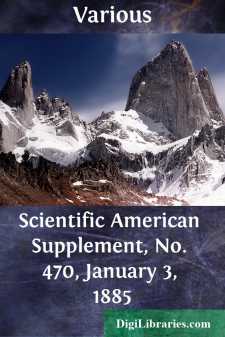Periodicals
- Art 27
- Children's periodicals 59
- Entertainment 5
- Food/Wine 2
- Games/Humor 455
- General 661
- Health 1
- History 53
- House/Home 1
- Regional 62
- Science/Nature
- Transportation 10
Science/Nature Books
Sort by:
by:
Various
THE LIFE AND CHARACTER OF OUR RELIGION. The character which the gospel of Christ requires is made up of all that is lovely, is formed upon the highest model, but it is not composed of the insensibility, the anger, the pride, the egotism, the worldliness, which is so common among men. It is not the cold indifference of modern moralists; it is not the rank and scepticism of modern doubters, nor yet the...
more...
by:
Various
A VISIT TO THE CREUSOT WORKS. Here we are at the great forge (Fig. 1), that wonderful creation which has not its like in France, that gigantic construction which iron has wholly paid for, and which covers a space of twenty-four acres. We first remark two puddling halls, each of which contains 50 furnaces and 9 steam hammers. It is in these furnaces that the iron is puddled. The ball or bloom thus...
more...
by:
Various
I have the honor this evening of addressing a few remarks to you upon the subject of influence machines, and the manner in which I propose to treat the subject is to state as shortly as possible, first, the historical portion, and afterward to point out the prominent characteristics of the later and the more commonly known machines. The diagrams upon the screen will assist the eye to the general form...
more...
by:
Various
FAURE'S MACHINE FOR DECORTICATING SUGAR-CANE. The object of the apparatus shown in the accompanying engraving is to effect a separation of the tough epidermis of the sugar-cane from the internal spongy pith which is to be pressed. Its function consists in isolating and separating the cells from their cortex, and in putting them in direct contact with the rollers or cylinders of the mill. After...
more...
by:
Various
MACHINE TOOLS FOR BOILER-MAKERS. We give this week an engraving of a radial drilling machine designed especially for the use of boiler-makers, this machine, together with the plate bending rolls, forming portion of a plant constructed for Messrs. Beesley and Sons, boiler makers, of Barrow-in-Furness. [Illustration: IMPROVED BOILER PLATERADIAL DRILL.] This radial drill, which is a tool of substantial...
more...
by:
Various
When Sir Henry Bessemer, in 1856, made public his great invention, and announced to the world that he was able to produce malleable steel from cast iron without the expenditure of any fuel except that which already existed in the fluid metal imparted to it in the blast furnace, his statement was received with doubt and surprise. If he at that time had been able to add that it was also possible to roll...
more...
by:
Various
THE DODDER. The genus Cuscuta contains quite a number of species which go under the common name of dodder, and which have the peculiarily of living as parasites upon other plants. Their habits are unfortunately too well known to cultivators, who justly dread their incursions among cultivated plants like flax, hops, etc. All parasitic plants, or at least the majority of them, have one character in...
more...
by:
A. Kempkey
The City of Victoria is situated on the southern end of Vancouver Island, in the Province of British Columbia, Canada, and is the capital of the Province. In common with all cities of the extreme West, its growth has been very rapid within the last few years. The population of the city proper, together with that of the municipality of Oak Bay, immediately adjacent, is now about 35,000. The Victoria...
more...
by:
Various
THE RIGHI RAILROAD. In the year 1864, the well-known geographer, Heinrich Keller, from Zurich, on ascending to the summit of the Righi Mountain, in the heart of Switzerland, discovered one of the finest panoramic displays of mountain scenery that he had ever witnessed. To his enthusiastic descriptions some lovers of nature in Zurich and Berne listened with much interest, and in the year 1865, Dr. Abel,...
more...
by:
Various
IRON PILE PLANKS IN THE CONSTRUCTION OF FOUNDATIONS UNDER WATER. The annexed engravings illustrate a method of constructing subaqueous foundations by the use of iron pile planks. These latter, by reason of their peculiar form, present a great resistance, not only to the vertical blow of the pile driver (as it is indispensable that they should), but also to horizontal pressure when excavating is being...
more...











